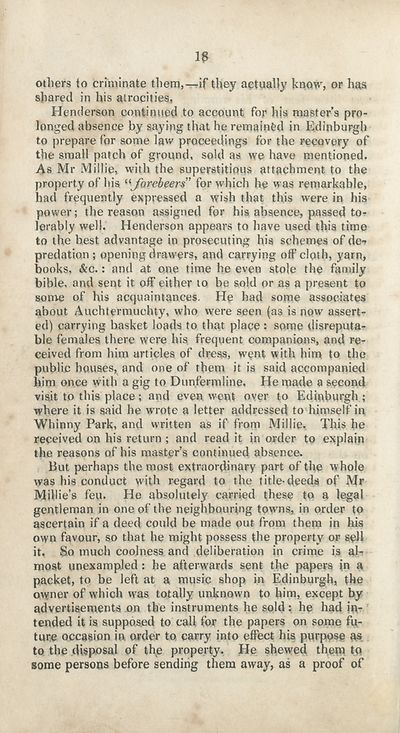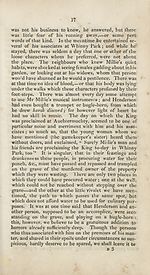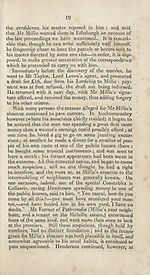Download files
Complete book:
Individual page:
Thumbnail gallery: Grid view | List view

IP
others to criminate them,-^if they actually know, or has
shared in his atrocities,
Henderson continued to account for his master’s pro¬
longed absence by saying that he remained in Edinburgh
to prepare for some law proceedings for the recovery of
the small patch of ground, sold as we have mentioned.
As Mr Millie, with the superstitious attachment to the
property of his forebeers” for which he was remarkable,
had frequently expressed a wish that this were in his
power; the reason assigned for hia absence, passed tor
lerably well. Henderson appears to have used this time
to the best advantage in prosecuting hia schemes of de-*
predation; opening drawers, and carrying off cloth, yarn,
books, &c.: and at one time he even stole the family
bible, and sent it off either to be sold or as a present to
some of his acquaintances. He had some associates
about Auchtermuchty, who were seen (as is now assert¬
ed) carrying basket loads to that place : some disreputa¬
ble females there were his frequent companions, and re¬
ceived from him articles of dress, went with him to the
public houses, and one of them it is said accompanied
him once with a gig to Dunfermline. He made a second
visit to this place; and even went over to Edinburgh ;
where it is said he wrote a letter addressed to himself in
Whinny Park, and written as if from Millie. This he
received on his return ; and read it in order to explain
the reasons of his master’s continued absence.
But perhaps the most extraordinary part of the whole
was his conduct with regard to the title-deeds of Mr
Millie’s feu* He absolutely carried these to a legal
gentleman in one of the neighbouring towns, in order to
ascertain if a deed could be made put from them in his
own favour, so that he might possess the property or sell
it. So much coolness and deliberation in crime is al¬
most unexampled : he afterwards sent the papers in a
packet, to be left at a music shop in Edinburgh, the
owner of which was totally unknown to him, except by
advertisements on the instruments he sold: he had in¬
tended it is supposed to call for the papers on some fu¬
ture occasion in order to carry into effect his purpose as
to the disposal of the property. He shewed them to
some persons before sending them away, as a proof of
others to criminate them,-^if they actually know, or has
shared in his atrocities,
Henderson continued to account for his master’s pro¬
longed absence by saying that he remained in Edinburgh
to prepare for some law proceedings for the recovery of
the small patch of ground, sold as we have mentioned.
As Mr Millie, with the superstitious attachment to the
property of his forebeers” for which he was remarkable,
had frequently expressed a wish that this were in his
power; the reason assigned for hia absence, passed tor
lerably well. Henderson appears to have used this time
to the best advantage in prosecuting hia schemes of de-*
predation; opening drawers, and carrying off cloth, yarn,
books, &c.: and at one time he even stole the family
bible, and sent it off either to be sold or as a present to
some of his acquaintances. He had some associates
about Auchtermuchty, who were seen (as is now assert¬
ed) carrying basket loads to that place : some disreputa¬
ble females there were his frequent companions, and re¬
ceived from him articles of dress, went with him to the
public houses, and one of them it is said accompanied
him once with a gig to Dunfermline. He made a second
visit to this place; and even went over to Edinburgh ;
where it is said he wrote a letter addressed to himself in
Whinny Park, and written as if from Millie. This he
received on his return ; and read it in order to explain
the reasons of his master’s continued absence.
But perhaps the most extraordinary part of the whole
was his conduct with regard to the title-deeds of Mr
Millie’s feu* He absolutely carried these to a legal
gentleman in one of the neighbouring towns, in order to
ascertain if a deed could be made put from them in his
own favour, so that he might possess the property or sell
it. So much coolness and deliberation in crime is al¬
most unexampled : he afterwards sent the papers in a
packet, to be left at a music shop in Edinburgh, the
owner of which was totally unknown to him, except by
advertisements on the instruments he sold: he had in¬
tended it is supposed to call for the papers on some fu¬
ture occasion in order to carry into effect his purpose as
to the disposal of the property. He shewed them to
some persons before sending them away, as a proof of
Set display mode to:
![]() Universal Viewer |
Universal Viewer | ![]() Mirador |
Large image | Transcription
Mirador |
Large image | Transcription
| Antiquarian books of Scotland > Crime & punishment > Whinny Park murder > (32) |
|---|
| Permanent URL | https://digital.nls.uk/126151049 |
|---|
| Description | Thousands of printed books from the Antiquarian Books of Scotland collection which dates from 1641 to the 1980s. The collection consists of 14,800 books which were published in Scotland or have a Scottish connection, e.g. through the author, printer or owner. Subjects covered include sport, education, diseases, adventure, occupations, Jacobites, politics and religion. Among the 29 languages represented are English, Gaelic, Italian, French, Russian and Swedish. |
|---|

